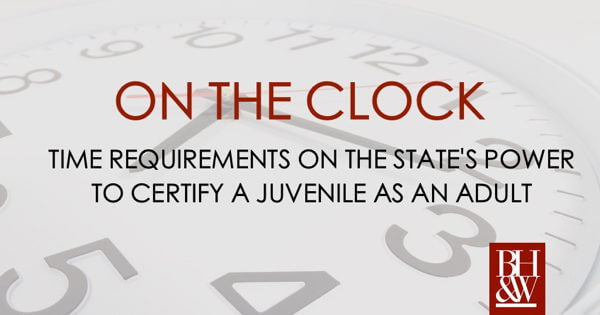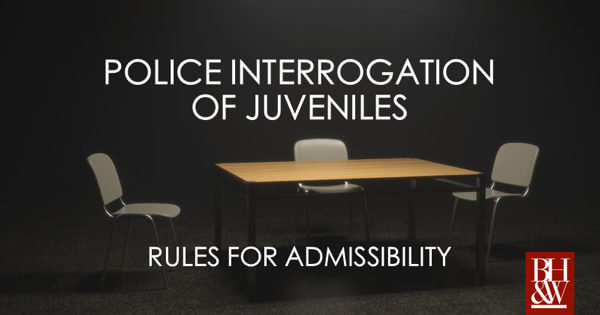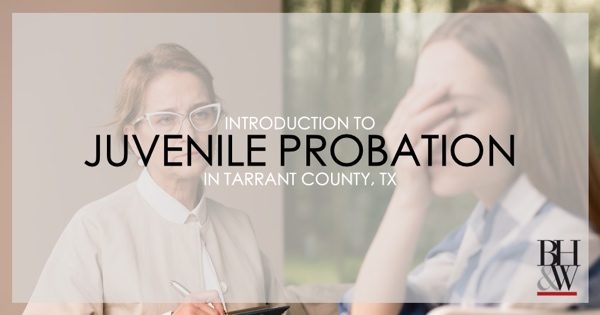The Nuts and Bolts of the Juvenile Certification Process
 The juvenile court has exclusive jurisdiction over offenses committed by juveniles (children ages 10-17) in Texas. The only exception to this, according to Texas Family Code Section 54.02, is when the court waives its jurisdiction and transfers a juvenile to an adult district court to face the adult criminal justice process. This is what is called certifying a juvenile as an adult. The Family Code lays out a process for when and how a juvenile may be certified.
The juvenile court has exclusive jurisdiction over offenses committed by juveniles (children ages 10-17) in Texas. The only exception to this, according to Texas Family Code Section 54.02, is when the court waives its jurisdiction and transfers a juvenile to an adult district court to face the adult criminal justice process. This is what is called certifying a juvenile as an adult. The Family Code lays out a process for when and how a juvenile may be certified.
The Process of Certification
Family Code Section 54.02 actually lays out two different processes for certification. One process is for cases in which the charged person is still a juvenile. The other one is for cold cases where the person accused was a juvenile at the time of the offense, but became an adult prior to the time the case went to court. This latter process is commonly referred to as a post-18 certification.
In all cases, per Section 54.02(a), the juvenile court may certify someone as an adult ONLY if the following factors are met:
- the alleged offense is a felony
- the child was 14 or older at the time of the offense if the alleged offense was a first degree felony, a capital felony, or an aggravated controlled substance felony or the child was 15 or older for any other felony
- no adjudication hearing has taken place for that offense, and
- during a hearing, the court finds that there is probable cause to believe the juvenile committed the offense.
Additionally, in all cases, the court must order, prior to the hearing, a complete diagnostic study to be done on the juvenile, which is to include information about his circumstances and the circumstances of the crime. This study must then be given to the court, prosecutor, and defense attorney prior to the hearing. This is required by Section 54.02(d) and (e).
The “Normal” Certification Process in Texas
If the person who is the subject of a certification proceeding is under the age of 18 at the time of court, under Section 54.02(a), the court must determine whether the welfare of the community requires the child to be certified as an adult due to either the seriousness of the offense or the background of the child. In making this determination, the court must take into account, along with other things, whether the crime was committed against a person or property, the sophistication and maturity of the child, the record and previous history of the child, the potential of adequate protection of the public, and the likelihood of appropriate rehabilitation of the child using the resources and services available in the juvenile system. These factors are laid out in Section 54.02(f).
Post-18 Certification in Texas
For cold cases, in which a person was a juvenile at the time of the offense, but is now an adult, the process is a little bit different. For these cases, the certification process is the only avenue available for prosecution. According to Section 54.02(j), in addition to the factors listed above regarding age and probable cause, which must be met in every certification case, the court must also find that either:
- because of a reason beyond the control of the State, it was not practicable to proceed prior to the person’s 18th birthday or
- after due diligence on the part of the State, it was not practicable to proceed with the case prior to the person’s 18th birthday because the State did not have probable cause and new evidence has been discovered since the 18th birthday.
Who Decides on Certification?
Initially, the District Attorney’s Office makes the decision whether to seek certification. If they decide to seek certification, then a hearing will be held. At the hearing, the juvenile court judge will be the person to determine whether the juvenile will be certified. There is no jury at a certification hearing. In Tarrant County, the juvenile prosecutor who is assigned to the case is the person who decides whether to pursue certification.
Across the state of Texas, certifications make up only a small percentage of juvenile cases. Most cases are kept in the juvenile system. In Tarrant County, there are only a handful of certification hearings held each year. Most of those are post-18 certifications on sex cases where the victim did not outcry about the offense until after the juvenile charged was 18 or older. On average, there are less than 5 certifications of juveniles who are still under the age of 18 per year in Tarrant County.
Possible Defenses to Juvenile Certification
Because the State must only prove by probable cause that the charged juvenile committed the offense, it is unlikely that defenses to the offense itself will be successful at a certification hearing. However, there are some other areas where a defense attorney can attack. In cases of a post-18 certification, the best possible avenues for the defense would be to attack the age of the juvenile at the time of the offense or the due diligence of law enforcement to investigate the case.
For normal certifications, a defense attorney should look to areas such as the maturity of the juvenile, and the likelihood of rehabilitation of the juvenile through the resources available in the juvenile system. A defense attorney should also highlight the positive aspects of the juvenile’s background, including responsible adults who could provide appropriate support and supervision for that child, positive educational and extra-curricular activities, and any treatment or mentoring that the child has had in the past which showed positive results. An attorney should also be pointing out things such as a low IQ, any mental health diagnosis, a lack of treatment for those problems, and how available resources within the juvenile system would be the best approach to address those things.
Legal Ramifications of Certification
If the juvenile court waives its jurisdiction and certifies a juvenile as an adult, the case will be transferred to adult court. From there, it will be treated as an adult case for all intents and purposes. The prosecutors must present the case to a grand jury for indictment. Adult punishment ranges will apply.
If, however, the juvenile court denies certification on an accused person who is still a juvenile, the case can still be pursued by the prosecution in juvenile court. In those post-18 certifications, if the court denies the certification, then the case is dead because the court will no longer, at that point, have jurisdiction over the person accused due to their age.
Certifying a juvenile as an adult is something that does not happen a lot in the State of Texas. It is even more rare in Tarrant County. However, when it does happen, there is a specific procedure laid out in Family Code Section 54.02 which must be followed in order for the certification to happen. The prosecutor gets to decide whether to seek certification, but it is up to the juvenile court judge to determine whether it will be granted. If granted, from that point on, the case and the juvenile will be treated as an adult and will be prosecuted in the adult system.
About the Author
Christy Dunn is a writer and attorney licensed to practice in Texas. She was a prosecutor for 15 years. The last five years of her prosecutorial career was spent in the Juvenile Division of the Tarrant County District Attorney’s Office. She has tried over 20 juvenile cases in Texas and multiple certification hearings. She was part of the multidisciplinary team that created a Project SAFeR.










